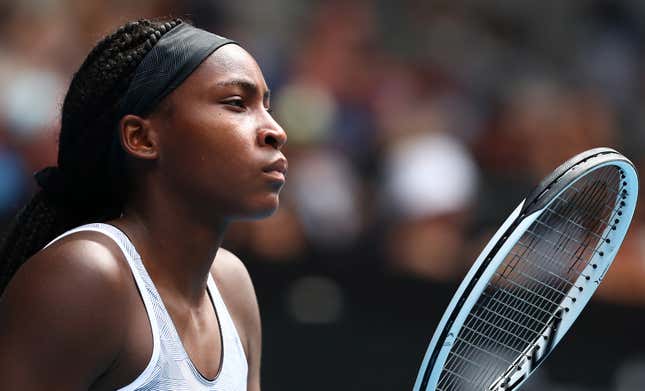
At 16, Coco Gauff is projected to become one of the tennis world’s greats—buzz that began when the Florida teen was only 11 and already four years into following in the footsteps of her idol, Venus Williams. At 15, Gauff would best her hero at Wimbledon in 2019—and again at the Australian Open earlier this year—drawing immediate predictions that she is the heir apparent to the Williams sisters’ legacy in American tennis.
“My mission is to be the greatest,” Gauff said in January after knocking Williams out in the first round (h/t the New York Times). “That’s my goal, to win as many Grand Slams as possible. But for today, my mission was to win.”
She may possess the requisite rhetoric of a winner, but as Gauff, a member of The Root’s Young Futurists Class of 2020, recently revealed in a deeply vulnerable post on the player-led platform Behind the Racquet, the pressure of being a tennis phenom has been accompanied by doubt, and occasionally, depression.
“I’ve always wondered how better or worse my life would be without tennis. With what this sport has given me I cannot imagine my life would be better without. At times I found myself too busy comparing myself to others,” she writes. “Most of my friends go to normal high school. I felt like they always seemed so happy being ‘normal’.”
Gauff credits her parents with doing “a great job of trying to make sure I did ‘normal’ childhood things”—like attending homecoming last year—but is nevertheless candid about the things she feels she’s missed out on while traveling the world to compete—like a lack of socializing as a result of homeschooling, something her so-called ‘normal’ classmates can now relate to, thanks to the coronavirus outbreak. And then, there is the relentless attention that comes with being a rising star and “juggling it all,” along with the mounting pressure Gauff admits caused her to doubt her chosen path and sink into a significant depression. Thankfully, she has learned to “let that all go.”
Throughout my life, I was always the youngest to do things, which added hype that I didn’t want. It added this pressure that I needed to do well fast...Right before Wimbledon, going back to around 2017/18, I was struggling to figure out if this was really what I wanted. I always had the results so that wasn’t the issue, I just found myself not enjoying what I loved. I realized I needed to start playing for myself and not other people. For about a year I was really depressed. That was the toughest year for me so far...I was just lost. I was confused and overthinking if this was what I wanted or what others did. It took many moments sitting, thinking and crying. I came out of it stronger and knowing myself better than ever.
Gauff goes on to write that part of her new coping strategy includes “a good circle of friends and family” and becoming “very careful” of who she keeps close. She has also leaned into her newfound status of role model, writing:
Personally for me, I like playing for more than myself. I have girls now coming up to me, of all races but mostly African Americans, saying they are picking up a racquet for the first time because of me. It amazes me since that is how I got into the sport. I remember about a month before Wimbledon going to the club I train at and seeing mostly boys playing. A month after I went back and the majority were girls and the trainer said it was because of me. I could never imagine that one tournament could have that kind of effect. For me, one of the biggest things is to continue breaking barriers.
While Gauff’s rise may clearly echo the barriers broken by those famed Williams sisters, whose mere presence upended the world of tennis while their power transformed the game, the younger player pushes back against comparisons to the two. She may now be training with and competing against the trailblazers (and scoring some hard-earned wins) but Gauff remains humble enough to realize she’s not yet in the same league as her idols—and rightly credits their successes on the court for making her own career possible.
I always feel like it’s not fair to the Williams sisters to be compared to someone who is just coming up. It just doesn’t feel right yet, I still look at them as my idols...Of course I hope to get to where they are but they are the two women that set the pathway for myself, which is why I can never be them. I feel like I wouldn’t even have the opportunity to be at this level without them. I would never have even thought about joining tennis, without them a part of it, since there were very few African Americans in the sport. For all they did, I shouldn’t yet be compared to them.
Perhaps most importantly, Gauff has begun to reject the perfectionism that so often erodes women’s self-image, even when we are wildly successful. In fact, her new perspective may be saving her growing game, as well as her sanity. “In the beginning, I thought I had to be perfect but I’ve done a lot of soul-searching and moved past it,” she writes. “Since doing that I’ve been having much more fun practicing and playing matches.”
Wise words from one still so young—and relatable insights from an already rising star.
“Everyone asks me how I stay calm on court and I think it’s because I accepted who I am after overcoming low points in my life,” Gauff writes. “Now, when I’m on [the] court, I am just really thankful to be out there.”

